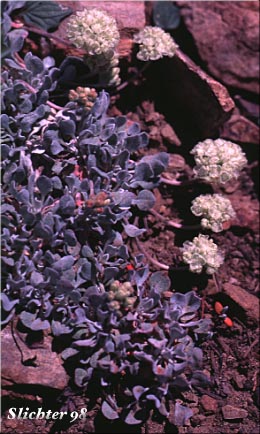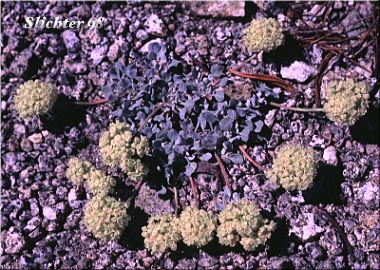 Characteristics:
Characteristics:
Cushion buckwheat is a low growing cushion plant 40 cm wide with leafless scapes up to 20 cm tall.The numerous grayish leaves have long petioles 1-3 times longer than the blades which range from spatulate to elliptic or oblanceolate in shape and 5-20 mm long and 3-15 mm wide. The herbage of the leaves varies from tomentose and nearly white on both surfaces to less tomentose and greener on the upper blade surface.
The inflorescence is typically a single spherical cluster atop the stem. The flowers are usually white, but occasionally yellow, often tinged with pink or purple. The involucres are cylindric to narrowly bell-shaped. They range from 3-5 mm long with 5 lanceolate teeth from 0.5-1.5 mm long. The flower parts are 3-4 mm long and glabrous.
Many plants of cushion buckwheat have characteristics similar to those of strict buckwheat, which is closely related.
Eriogonum ovalifolium var. depressum - Low-growing mat plants subalpine to alpine. Leaves often greenish, especially on the upper surface. Leaf blade elliptic, oblong or spatulate.
Eriogonum ovalifolium var. nivale - Low-growing mat plants subalpine to alpine. Leaves whitish or silvery on both surfaces, the blades often round.
Eriogonum ovalifolium var. purpureum (E. orthocaulon or E. celsum) - Taller plants found from the plains and deserts to moderate mountain altitudes. Flowers often white, cream or purplish with the perianth 4-6 mm long. Leaf blades either more than two times longer than wide or longer than 1.5 cm long. Leaves 3-6 cm long, the blades obovate in shape and 5-20 mm long.
Eriogonum ovalifolium var. ovalifolium - Taller plants found from the plains and deserts to moderate mountain altitudes. Flowers yellowish, the perianth from 4-6 mm long. Leaf blades rarely over twice as long as wide, the blades oval to rhombic and 10-60 mm long.
Interspersed with sagebrush from foothills to mountain ridges.
Southern British Columbia along the east side of the Cascades to southern California, east to the east slopes of the Rocky Mts..
Oval-leaf buckwheat is a nice buckwheat for the rock garden. Due to it's low stature, it would best be placed in an area of good drainage at the front of the garden. My one attempt at this wildflower was successful for several years until we had 10 inches of rain in a week, which killed it. I would recommend covering it during the wettest parts of the winter if you live in areas with potential for high rainfall.
